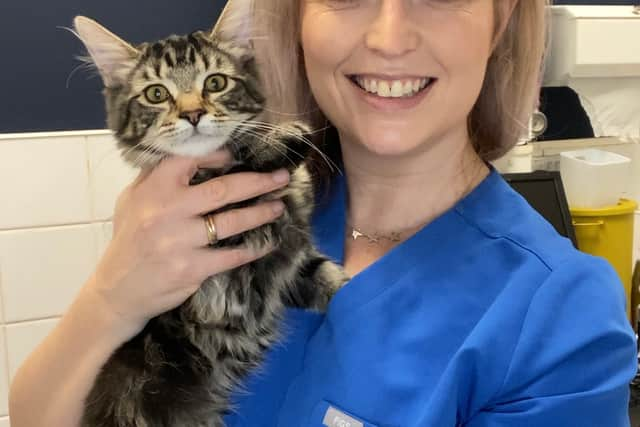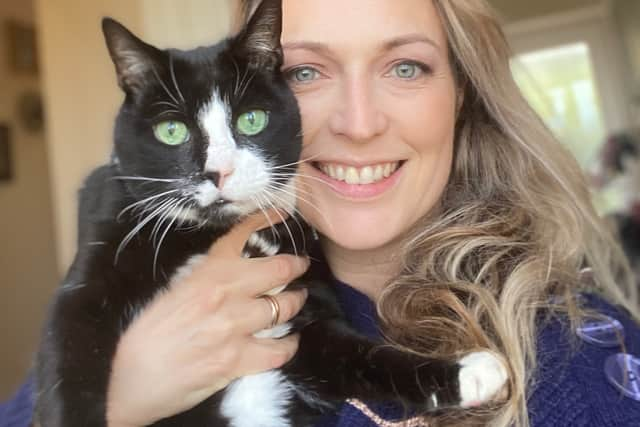Millions of UK cats are yet to be microchipped


One in three cat owners in England aren’t aware that in eight weeks, new laws will be brought in that require felines to have a chip.
But even though the UK is a nation of cat lovers with nearly a third of owners (30 per cent) stating they love their cat more than humans, some have still not microchipped their furry friends.
Advertisement
Hide AdAdvertisement
Hide AdAs the clock counts down and the new rules come into effect, those owners who do not take action to microchip their cat by the deadline risk breaking the law and facing a fine of up to £500.
The research of 2,000 cat owners found one in five owners say their feline has gone missing from their home, with 70 per cent stating this happens a few times every year for an average of three days.
For veterinary practices, animal welfare organisations and other animal health professionals it can be incredibly challenging to reunite unchipped pet cats with their owner if they are missing or stolen.
Despite this, one in four cat owners are still yet to get their cat microchipped. Cat owners are being urged to make an appointment at their local veterinary practice to urgently arrange microchipping.
Advertisement
Hide AdAdvertisement
Hide AdPosting their cat on social media is the most commonly cited action a cat owner says they would first take if their pet went missing (27 per cent).
However, reporting it to the feline’s microchip database should also be top on the priority list.


Reducing the risk
According to Michelle Townley, veterinary adviser to HomeAgain®, part of MSD Animal Health, microchipping provides owners the best chance of being reunited with their cat as quickly as possible.
She said: “It is absolutely heartbreaking when a beloved cat goes missing and it is often our biggest fear when it comes to our pets. They are notoriously curious animals and frequently get themselves stuck in people’s garages, sheds or even delivery vehicles.
Advertisement
Hide AdAdvertisement
Hide Ad“Sadly, I’ve heard countless stories of cats going missing miles away after being caught in postal vans. When a pet is found and taken to a shelter or veterinary clinic, the first thing they do is scan the animal for a microchip.
“Unlike collars and tags that can get lost or removed, microchipping provides a permanent and effective means of identification. It is a quick, painless and simple procedure that gives owners peace of mind that their cat can be easily identified once they’re found.”
Owners should register their cat’s microchip with a Government compliant microchip registration database such as HomeAgain’s Pet Recovery Database, and keep details up to date.
There are stark differences across the country when it comes to the number of felines that go missing and the numbers microchipped, revealed in HomeAgain’s Cat Map of the UK, based on the survey results.
Advertisement
Hide AdAdvertisement
Hide AdBirmingham is lagging behind other major cities as the June cat microchipping deadline approaches.
Nearly four in 10 (39 per cent) of owners have not microchipped their pet or are unaware if they have done so, even though one in five say their cat goes missing a few times a week.
In the capital, 24 per cent have lost their cat before with over a quarter (28 per cent) of Londoners stating their cat frequently goes missing for up to 2-4 days.


Arrange the appointment
However, more a quarter (28 per cent) have not microchipped their cat or are unsure if they have done so. This compares starkly with Gloucester where only five per cent of cat owners say they are yet to microchip their pet.
Advertisement
Hide AdAdvertisement
Hide AdAlice Potter, RSPCA cat welfare expert, said: “We sadly see many incidents where cats have been hit by a car or strayed away from home who never end up being reunited with their owner as they weren’t microchipped.
“Microchipping your pet is the surest way to help ensure that should they get lost or become injured they can be reunited with you.
“Pets are like family members and so we understand the pain and distress of losing a much-loved pet; but by ensuring they are microchipped - and the details kept up-to-date - cat owners are much more likely to be reunited with their companions.”
Cat the Vet, a UK qualified and practicing vet as well as social media influencer with over 323.6k followers on TikTok, said: “With 1.5 million cats yet to be chipped in the UK, the vet profession is going to have a busy few months ahead.
Advertisement
Hide AdAdvertisement
Hide Ad“As well as being required by law from June, microchipping is a key way for vets to reunite cats with their beloved families. It’s a quick, stress-free process for cats and their owners and new technology means some chips can even accurately read body temperature – paying even more dividends than just identification!”
“All cats have the potential to go missing, even the ones who live 100 per cent indoors with windows easily being left open.
“Plus, our senior kitties can get easily confused if they wander too far. I urge all those with a feline family member who isn't microchipped to contact their vet as soon as possible to arrange microchipping for their cat. It will give you peace of mind now and for the future.”